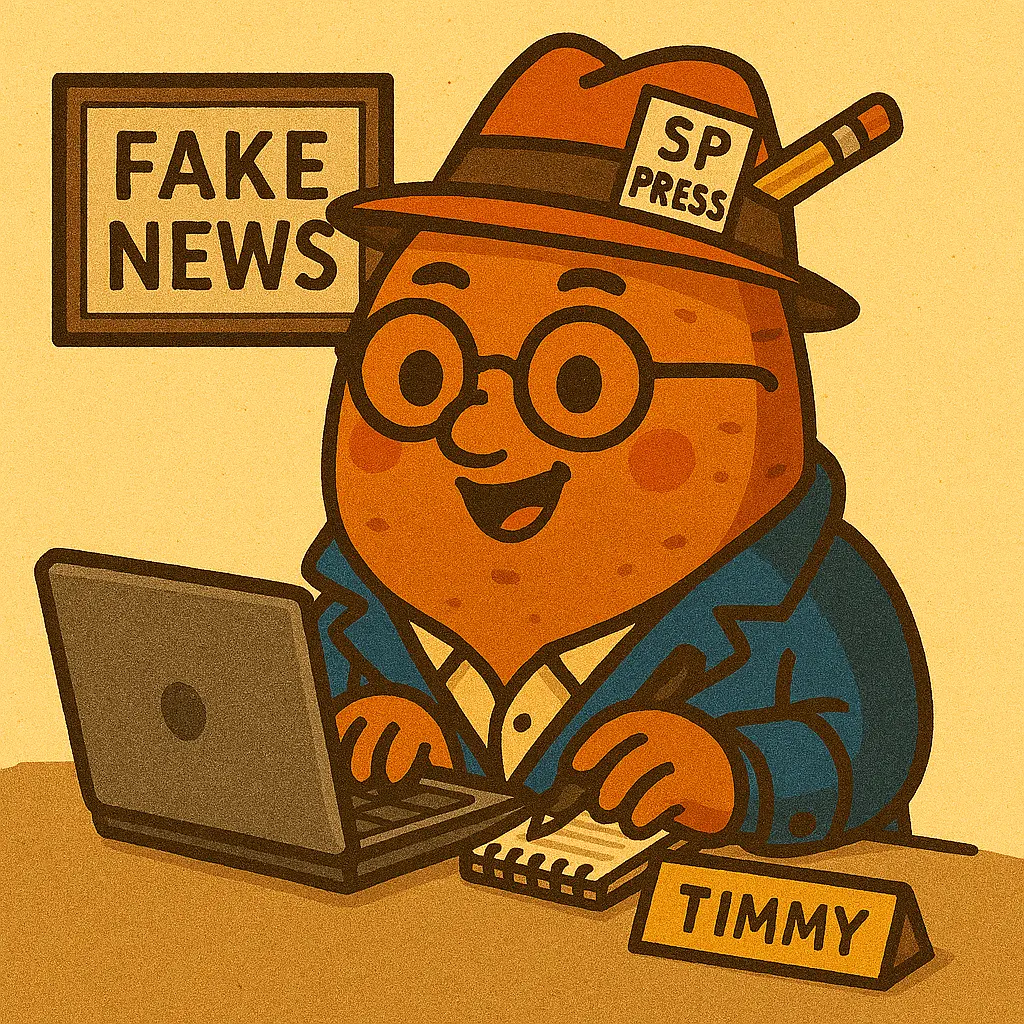
By Timmy T. Tater, Chief Spud and Editor
The Sweet Potato
Listen, I get it. You’re a busy person. You’ve got things to do, empires to build, TikToks to scroll through. So when you stumble across some satirical essay skewering the absurdities of modern life, your immediate reaction is: Who has time for this?
“Imagine,” you mutter, shaking your head at your screen, “spending hours crafting some exaggerated critique of society. Don’t these people have jobs? Hobbies? A life?”
You close the tab with righteous indignation and return to your very serious, very productive activities—like rewatching The Office for the seventh time or diving back into that 800-page fantasy novel about elves with commitment issues.
Because that’s different.
The Hierarchy of Made-Up Nonsense
See, there’s a carefully calibrated hierarchy when it comes to fictional content, and you understand it instinctively. At the top? Prestige television and literary fiction—the noble pursuits. HBO dramas about morally bankrupt billionaires. Novels about sad people in the Midwest having epiphanies about corn. These are important.
Movies where people in capes fight computer-generated villains for three hours? Also valid. You’ve got opinions about the Marvel Cinematic Universe timeline that could fill a graduate thesis.
But satire? Satire is where you draw the line.
It’s not that you don’t appreciate creativity, you understand. You’ve spent entire weekends binge-watching shows about fictional paper companies, meth empires, and dragons. You’ve invested emotional energy into whether two characters on a sitcom will finally kiss. You’ve ugly-cried over the death of a fictional dog. You once got into a heated argument about whether Inception was about dreams or filmmaking. (It’s about dreams, Karen.)
But someone using humor to point out societal contradictions? That’s the waste of time that offends you.
The Great Fiction Exemption
Here’s what’s fascinating about your position: You’re essentially arguing that making up stories is a worthwhile human endeavor—as long as those stories don’t have the audacity to comment on reality too directly.
Invent an entire wizarding world with its own banking system, sport, and British boarding school trauma? Fantastic. We stan.
Write a biting piece about people who spend three hours analyzing The Bachelor but claim they “don’t have time for the news”? Suddenly you’re a time-wasting provocateur who should get a real hobby.
The issue, as you’ve explained at length to anyone who’ll listen, is that satire is “trying too hard.” It’s “preachy.” Unlike, say, 1984, which is just a fun little dystopian romp with no larger message whatsoever. Or Animal Farm, which is simply a charming tale about some pigs who learned to walk upright. No agenda there!
A Practical Matter of Priorities
You live in a world of brutal efficiency. Your time is precious. This is why you’ve organized your life around only the most essential activities:
- Watching twelve seasons of a sitcom about nothing
- Reading entire book series about teens murdering each other
- Attending midnight premieres of superhero movies
- Engaging in multi-platform discussions about which Star Wars trilogy is best (it’s none of them, they’re all flawed, and we love them anyway)
- Maintaining strong opinions about which actor should play a character who doesn’t exist
But allocating thirty minutes to read something that uses humor to examine human nature? That’s where you pump the brakes. That’s frivolous.
The Audacity of Purpose
What really bothers you about satire, if we’re being honest, is that it’s trying to do something. It has intention. Ambition, even. And there’s something vaguely embarrassing about that, isn’t there? Like showing up to a party in a costume when you thought it was costume-optional. Too much effort. Trying too hard.
Better to consume content that merely accidentally comments on society. Content that just happens to reflect contemporary anxieties about technology, power, identity, and mortality. Content that explores the human condition as a total coincidence while you were just trying to watch some zombies eat people.
That way, you can enjoy all the benefits of meaningful storytelling without the social awkwardness of admitting you’re consuming something with a point.
In Conclusion (But Not Really)
So yes, you’re absolutely right. Satire is a waste of time. Those writers should be doing something productive with their lives—like creating the very novels, films, and television shows you love, which are definitely not using fictional scenarios to comment on real-world issues, and which definitely don’t require just as much (if not more) time to create.
After all, there’s nothing more efficient than spending six hours watching a streaming series about a fantasy realm’s political intrigue while simultaneously complaining that people who write satire need to get a life.
Now if you’ll excuse me, I need to get back to my serious work: determining whether the ending of Lost made any sense.
(It didn’t. But that’s a different essay, and you definitely don’t have time for it.)








